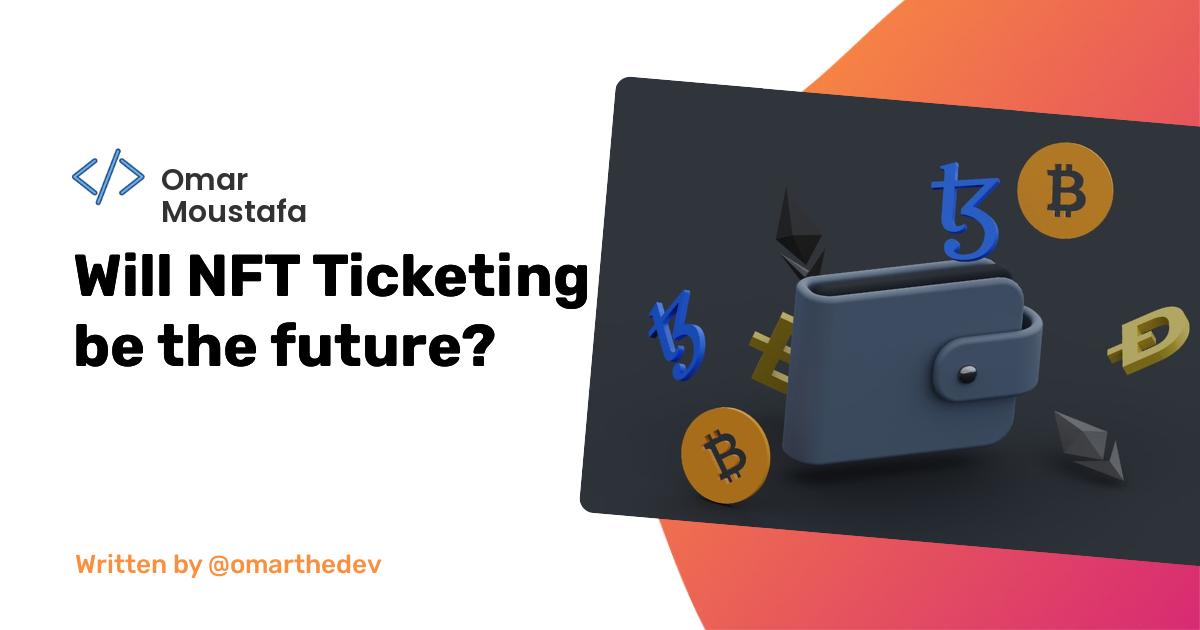NFTs is a great way to prove ownership on the internet, even digitally. An interesting use case of NFTs is the NFT-powered ticketing system. Today, we will talk about:
- What is the NFT Ticketing System?
- How does the NFT Ticketing System work?
- My opinion:- Will NFT Ticketing will be the future of tickets?
What is the NFT Ticketing System?
NFTs, short for a non-fungible token which non-fungible means that thing is not exchangeable, and where token here means any digital asset, a video, a GIF/picture, whatever you can expect which says that an NFTs is a digital asset/file and it's non-exchangeable.
NFT tickets are digital assets that hold your access credentials to a particular event. They can also offer ticket holders some special perks such as exclusive merchandise and more. On top of helping establish a closer relationship with fans, NFT tickets can provide ongoing royalties for artists, event organizers, and stakeholders.
How Does NFT Ticketing work?
If you think about the way NFT works, it seems to fit well with event tickets. Physical tickets are usually a one-off piece of paper and only valid for one event admission or seat. In both ways, those tickets are non-fungible, if physical, digital, or even considered as an NFT.
However, the downside of traditional ticketing is that tickets go through a few distribution channels with limited regulation or control. For example, resellers in the secondary ticket market can inflate prices, and ticket scalpers can buy up most tickets online to resell at a higher price. With NFT tickets, anyone can track the transactions on a blockchain ledger, making it easier for everyone to see when and where the ticket was bought and sold – while event organizers are afforded more control over primary and secondary ticket sales.
An NFT ticketing system can also help limit resale value and fees with the help of a smart contract, a program that runs on the blockchain. A smart contract is a deterministic program that self-executes particular tasks when and if certain conditions are satisfied. Organizers can determine how royalties are split on secondary ticket sales by setting up a rule that can trigger a royalty payment whenever the ticket is sold to a new owner.
Additionally, event organizers can forgo third-party distribution by minting the amount of NFT tickets they need on their preferred blockchain network as part of the ticketing system. Once they set the sale or auction price, payment from a buyer will trigger a smart contract. The NFT ticket will then be sent to the buyer's digital wallet, allowing them to access it anytime via their phone. Because the NFT ticket is stored on a blockchain network, you can also choose to resell your ticket on the NFT marketplace designated by the event organizer. Once someone buys your ticket, a smart contract is triggered, and you'll receive payment while the buyer gets the ticket.
Artists can also use NFT tickets to reward long-time fans with exclusive airdrops or other perks to elevate their experience. A real-world example of NFT tickets in action was Binance's partnership with Southern Europe's largest music festival: Primavera Sound.
Ok Omar, but why NFTs?
NFT ticketing can potentially disrupt the traditional ticketing industry by solving the inefficiencies faced by the current ticketing system.
Preventing forgery
One of the major downsides of paper tickets and QR Codes is that they can be easily forged, creating a gap in security for event venues and disappointment for fans who unknowingly bought a fake ticket. But since NFT ticket transactions are recorded on a blockchain ledger, event organizers and attendees can validate the authenticity of every ticket on the chain and track the history of ownership. Making it near impossible for bad actors to falsify a ticket.
Reduce costs and faster production
The costs associated with selling and minting NFT tickets can be potentially lower than the cost needed to produce and distribute traditional tickets. NFT tickets can often require much less production lead time than physical tickets, allowing organizers to mint and distribute tickets within a few hours.
Ongoing revenue opportunities
The blockchain technology behind NFTs opens up the potential opportunity to generate tangible value for all involved. NFT tickets can provide ongoing royalties to the artist and event organizer via smart contract technology. If a ticket holder sells their ticket on a secondary marketplace, a percentage of the resale revenue may also be redirected to the artist. Ticket holders can also resell NFT airdrops they are gifted as a part of the ticket’s built-in rewards.
Lowers chances of loss or damage
Traditional paper-based tickets can be easily lost or damaged. Since NFT tickets are stored in a digital wallet that can be accessed via a mobile phone, the risk of losing or damaging your ticket is exponentially lower.
My Opinion: Are physical/digital ticketing systems going to stay?
Most probably we cannot still stop using digital tickets while who uses physical tickets now? No one! So maybe in the soon future NFT-powered tickets are going to start being used by many users and then more people will start using the NFT-powered ticketing system and then we can stop using the traditional digital ticketing system with traditional QR codes.
Outro (The quote of the day)

